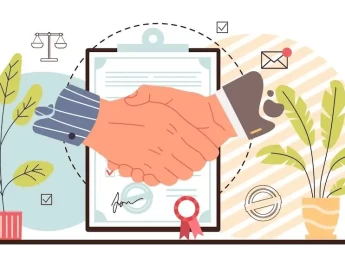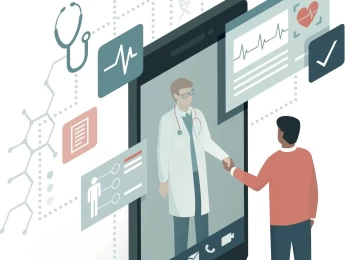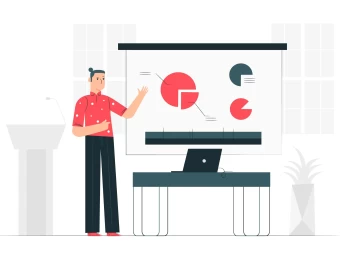Managing a team in today’s society requires more than excellent planning and organisational skills. You need to be able to connect with your team, motivate them when times are hard, and inspire them to follow you as a role model to ensure the department moves forward towards a collective goal.
More recently, thanks to the increase in remote working styles, managers and leaders are expected to connect with their teams at a distance, using technology to aid them. This requires excellent communication skills because body language isn’t as easy to convey.
Communication is the optimum way to develop a department and ensure everyone performs to the expected standard. It means that the team needs to fully understand its goals, its development areas, and how to improve in a positive and supportive environment.
External communication is also an essential requirement when it comes to good leadership. Your strategic aims must be pitched to stakeholders and partners to maintain funding and increase development opportunities internally. You may also have customers and clients who need to buy into your methodology to keep those profits rolling in and feel that your team is happy doing their work behind the scenes. Having a good reputation as an employer also helps to grow a business internally and externally.
Upon completion of this course, participants will be able to:
- Build effective relationships between colleagues to benefit the wider business aims.
- Effectively convey business strategy, ensuring everyone is on the same path.
- Motivate employees and create a happy and progressive working environment.
- Ensure remote teams still maintain communication channels and work together.
- Create a welfare culture so all employees support each other.
- To develop mutually beneficial relationships between your business and its stakeholders and partners.
- Practice active listening skills to gain insight into future changes.
- Regularly ask for feedback on procedures and management styles to aim for continuous improvement.
- Ensure all employees understand their strengths and development areas to maintain talent management.
This course is designed for anyone who leads a team to work towards company goals and needs to discover new, innovative methods of motivation. It would be most beneficial for:
- Business Owners
- Team Managers
- Team Leaders
- Supervisors
- Operations Managers
- Training & Development Professionals
- HR Personnel
- Account Managers
- Those developing into leadership roles
This course uses a variety of adult learning methods to aid understanding. Participants will participate in practical activities and questionnaires to utilise communication methodology and theories. They will enact role-playing activities to develop their negotiation skills and learn how to deal with difficult conversations to achieve a positive outcome.
Participants will leave the session having planned out a variety of motivational techniques and projects to bring their team together and ensure an aligned business strategy that involves each employee.
Day 5 of each course is reserved for a Q&A session, which may occur off-site. For 10-day courses, this also applies to day 10
Section 1: Active Listening Skills & Giving Feedback
- Paying attention to body language.
- Learning from others.
- Asking appropriate questions to gain the right information.
- Reframing your questions to aid understanding.
- One-on-one feedback sessions.
- Ensuring timely feedback to develop employees.
Section 2: Collaboration & Building Trust
- Building loyalty and consistency.
- Encouraging openness and sharing best practices.
- Developing a collaborative culture.
- Pushing accountability.
- Key Performance Indicators and effective monitoring.
- Creating a cohesive and supportive team mentality.
Section 3: Your Visions, Priorities & Managing Talent
- Setting clear goals and priorities.
- Creating a culture of shared ownership.
- Understanding deadlines and milestones.
- Explaining expected performance standards.
- Generating commitment.
- Sharing successes.
Section 4: Motivating a Team Successfully
- Personalised targeting and scorecards.
- Creating a collective sense of urgency.
- Motivating games and activities.
- Motivational techniques and theories.
Section 5: The Challenges of Remote Working
- Managing remote meetings.
- Finding the best systems to stay in touch.
- Understanding a diverse workforce.
- How to identify when an employee is struggling remotely.
- A positive outcome focus.
- Maintaining active interest and participation.
- Setting clear goals and displaying results.
Section 6: Negotiation & Difficult Conversations
- Managing meetings effectively.
- Win-win negotiation techniques.
- Entering into discussions and debates.
- Providing your opinion with tact.
- Setting expectations and presenting positive solutions.
- The positive-negative sandwich for relaying information.
Section 7: Presenting Results & Action Planning for the Future
- The perfect presentation.
- Your strategic action plan and implementation structure.
- Creating a structured call to action.
- Body language, dress code, and voice.
- Building an initial rapport.
- Avoiding stage fright and responding well to difficult questions.
Upon successful completion of this training course, delegates will be awarded a Holistique Training Certificate of Completion. For those who attend and complete the online training course, a Holistique Training e-Certificate will be provided.
Holistique Training Certificates are accredited by the British Assessment Council (BAC) and The CPD Certification Service (CPD), and are certified under ISO 9001, ISO 21001, and ISO 29993 standards.
CPD credits for this course are granted by our Certificates and will be reflected on the Holistique Training Certificate of Completion. In accordance with the standards of The CPD Certification Service, one CPD credit is awarded per hour of course attendance. A maximum of 50 CPD credits can be claimed for any single course we currently offer.
- Course Code MG2-124
- Course Format Classroom, Online,
- Duration 5 days













